LOVE BOAT: TAIWAN – Taiwanese Americans on the Sea of Root Discovery
November 16, 2019
By Dr. Craig D. Reid
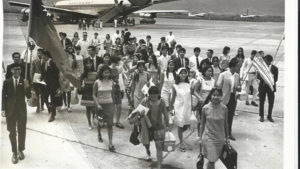 Each year since the Taiwan Film Showcase partnered with the San Diego Asian Film Festival in 2012, something always magical happens to me as I come face-to-face with something from my past that has a deep relevance with my time as a graduate student at National Taiwan University from 1979-1981. The irony about this year’s flashbacks, director Valerie Soe’s Love Boat: Taiwan, a documentary about a Taiwan government program created in 1967 to help Taiwanese American teens to learn about their heritage and connect with the culture, that even though I’m a white, blue-eyed, British American, I strongly associate with their six-week deep dive into something that in many facets was just as foreign to them as it was for me.
Each year since the Taiwan Film Showcase partnered with the San Diego Asian Film Festival in 2012, something always magical happens to me as I come face-to-face with something from my past that has a deep relevance with my time as a graduate student at National Taiwan University from 1979-1981. The irony about this year’s flashbacks, director Valerie Soe’s Love Boat: Taiwan, a documentary about a Taiwan government program created in 1967 to help Taiwanese American teens to learn about their heritage and connect with the culture, that even though I’m a white, blue-eyed, British American, I strongly associate with their six-week deep dive into something that in many facets was just as foreign to them as it was for me.
Crazy food (stinky tofu being one), 110o F heat, 100% humidity, exceedingly tight living dormitory quarters, lot of restrictions, curfews, sneaking out at night by climbing over walls and as several kids pointed out in regard to culture shock, “Everyone has black hair.”
One interesting difference for me was my campus dormitory’s wall had broken chards of glass cemented on top of the wall to prevent us from leaving and female dorms has barbed wire on top of their walls to not only keep the females from leaving but to also prevent the guy from entering. Also in 1979, disco parties were illegal and any dances were done in silence, with music barely audible and conversations kept to a whisper.
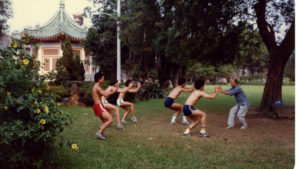 Yet for many who rode the Love Boat program back in the day, they didn’t adhere to the government’s plan of trying to instill a sense of support for the ruling Kuomintang (KMT), in hopes that the attendees might become Ivy Leaguers or American Statesmen and thus be in a future position to support the country. Instead, these free from their parents’ grasps on traditional values on fraternization, turned the tour into a romping headquarters for partying and liaisons of the heart and rampaging adolescence. This is how the program became known as The Love Boat (1976-1990), a popular TV show of the time when a couple’s fantasies on a cruise would come to fruition.
Yet for many who rode the Love Boat program back in the day, they didn’t adhere to the government’s plan of trying to instill a sense of support for the ruling Kuomintang (KMT), in hopes that the attendees might become Ivy Leaguers or American Statesmen and thus be in a future position to support the country. Instead, these free from their parents’ grasps on traditional values on fraternization, turned the tour into a romping headquarters for partying and liaisons of the heart and rampaging adolescence. This is how the program became known as The Love Boat (1976-1990), a popular TV show of the time when a couple’s fantasies on a cruise would come to fruition.
Another popular show of the ’70s in Taiwan was Three’s Company, a sitcom about two single girls and single guy living together in an apartment where because the landlord is against the co-ed lifestyle, the guy said he was gay. When I taught English in Taiwan, a common question my students asked was, “How many women did I live with in America.” When I joked, “Three”, the women feared me and the guys praised me.
Though Soe, an alum of Love Boat, doesn’t tiptoe around the sociopolitical issues of Taiwan throughout the years of the program, the propaganda insinuations or the flirtatious debauchery that lead to an occasional pregnancy, the crux of the film is the alumni interviews as they relive their moment, with tears, laughter and the eventual understanding on the value of their time in Taiwan.
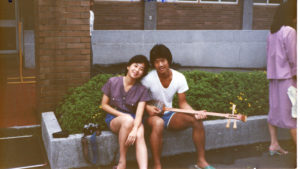 Cases in point. One of Love Boat‘s alum that’s highlighted in the film is US Congresswoman of California Judy Chu who has become an important advocate for Taiwan’s existence as a democracy. In 2012, Chu was also responsible for introducing a resolution into the House of Representative contending that the House formally expresses their regret in passing the Chinese Exclusion Act. It was the fourth time in history that the U.S. Congress issued an apology to a group of people.
Cases in point. One of Love Boat‘s alum that’s highlighted in the film is US Congresswoman of California Judy Chu who has become an important advocate for Taiwan’s existence as a democracy. In 2012, Chu was also responsible for introducing a resolution into the House of Representative contending that the House formally expresses their regret in passing the Chinese Exclusion Act. It was the fourth time in history that the U.S. Congress issued an apology to a group of people.
Please check out the blog on SDAFF’s presentation of Chinatown Rising for details on the Chinese Exclusion Act and the events leading up to it.
And of course another important alum is the film’s director Valerie Soe, the professor of Asian American Studies at San Francisco State University proffers similar supportive wisdom sharing, “It’s an interesting time to make Love Boat because with the internet and popularity watching K-pop and Jay Chou videos online, there’s a greater consciousness about Asian culture than 10 years ago.”
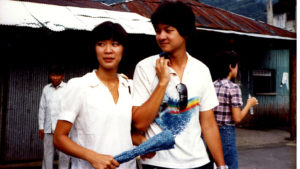 Though Soe isn’t Taiwanese or her family never lived in Taiwan, her mum’s family was active in the KMT in China and thus Soe was raised with positive thoughts in regard to Taiwan. As a result of making the film she became more endeared to the Island, which expanded her mission of wanting audiences to learn about Taiwan through the film noting, “It would be great if people understood what’s going on in Taiwan and not think it’s Thailand or part of China. And also to realize that apart from being a great place, its made great contributions. If that gets swallowed up by China, it would be sad.”
Though Soe isn’t Taiwanese or her family never lived in Taiwan, her mum’s family was active in the KMT in China and thus Soe was raised with positive thoughts in regard to Taiwan. As a result of making the film she became more endeared to the Island, which expanded her mission of wanting audiences to learn about Taiwan through the film noting, “It would be great if people understood what’s going on in Taiwan and not think it’s Thailand or part of China. And also to realize that apart from being a great place, its made great contributions. If that gets swallowed up by China, it would be sad.”
One piece of information that most don’t know is that back in 1978, the then Republic of China, despite teetering on first and third world country status, it was a top-five donor to the World Bank, which provides low-interest loans, interest free credit and grants so small countries can focus on improving education, health and infrastructure. In 2018, China was the second largest recipient of World Bank loans.
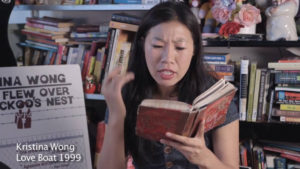 One of the most memorable humorous stories in the film came from a person who had attended the program during its early years. He grinningly recalled that the camp counselors once told them a story that because Taiwan had three tanks, they were going to march over to Communist China, drive the tanks right up into Tiananmen Square and conquer the country. He had that are you kidding me face we’ve all had at one time or another when we hear something so incredibly preposterous, but at one point of time, folks truly considered it a real possibility.
One of the most memorable humorous stories in the film came from a person who had attended the program during its early years. He grinningly recalled that the camp counselors once told them a story that because Taiwan had three tanks, they were going to march over to Communist China, drive the tanks right up into Tiananmen Square and conquer the country. He had that are you kidding me face we’ve all had at one time or another when we hear something so incredibly preposterous, but at one point of time, folks truly considered it a real possibility.
During a destructive typhoon in 1981, I read in one of the state-run English language newspapers that the Communists sent the typhoon over to destroy the country. Aiyah!
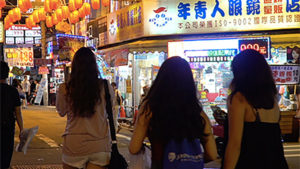 Soe additionally adds, “I was hoping that people who never had the opportunity to make the trip that they could relate to what was happening in the film, not just Asian but anybody who’s had some kind of a personal kind of cultural awakening.”
Soe additionally adds, “I was hoping that people who never had the opportunity to make the trip that they could relate to what was happening in the film, not just Asian but anybody who’s had some kind of a personal kind of cultural awakening.”
For what it’s worth, I spoke to an audience member in passing who is half-Taiwanese and didn’t know much about Taiwan. She shared that due to the film, she felt more connected to the Taiwanese half of herself.
To director Soe…mission accomplished.

 tweet
tweet share
share